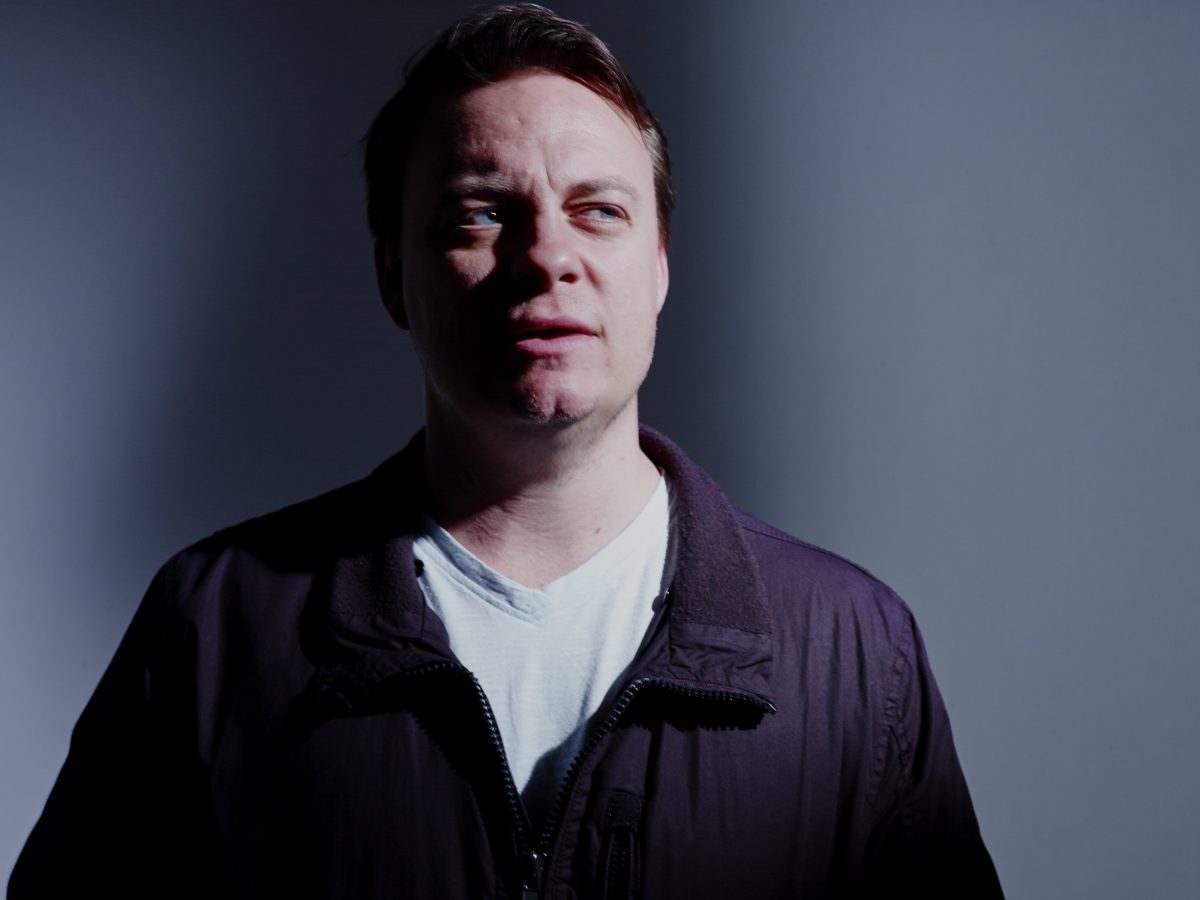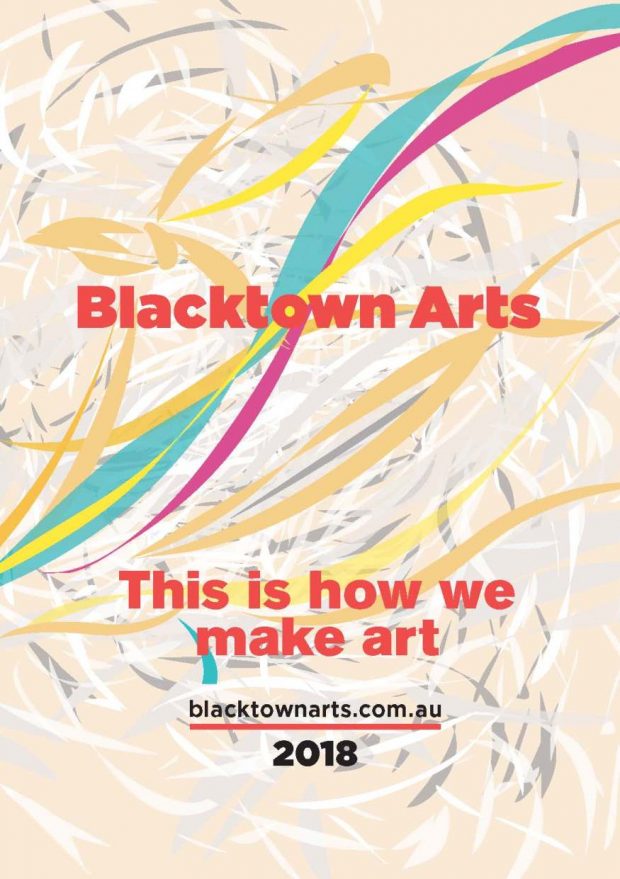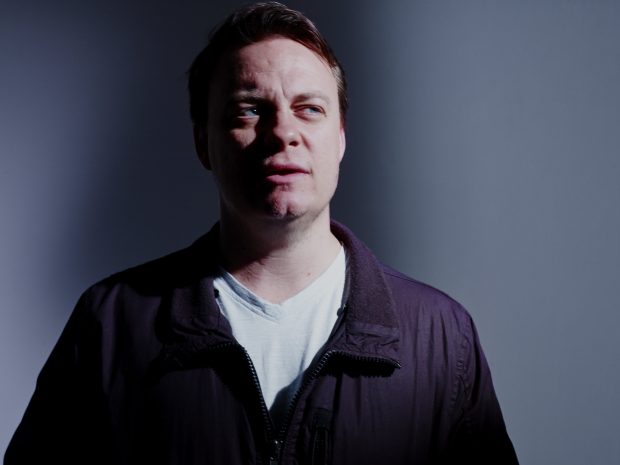
Keep Going, Get Better || Luke Carman
Words || Luke Carman
In November 2018 there was an arts festival out in Blacktown. Each evening the festivities began with an address from a Bigambul Elder named Uncle Wes, who told stories on the library steps with his mic crackling against the caprice of the summer wind. His audience listened in silence, and once he was finished with them they were led around the city’s streets by singers, dancers and other assorted troubadours to witness an ensemble of shows put together by artists from across the country. The crowds were taken down alleys, through the backdoors of an empty cantina and into a Lynchian telephone installation. They saw acrobats in leotards bouncing on hand-woven trampolines in an eerie panopticon of shopfronts and roller-shutters opened before them to reveal drumming virtuosos hammering their instruments outside take-away bars. They were taken to eat enormous feasts put on by local restaurants whose owners told stories of fleeing from far away countries to set up shop in the outer reaches of Sydney.
At a table in one of these restaurants, I was asked by a couple of strangers who’d come in from Annandale how it was I’d come to be at the show. ‘Did you hear about it from friends?’ They asked me, making polite conversation across the steaming dishes and bowls that were placed before us by the restaurant owners’ adult children. I tried to explain, with a close check on my pride and resentment, that for a while I expected to be in the festival, ‘In a round-about way,’ I added, hoping to emphasise a tone of ambivalence.
While we ate from heavy bowls of rice and stewed meats with rich sauces, I told the patient couple that way back in November 2017, when the thought of an arts festival in Blacktown was only a dream in the fervid mind of its director, the theatre company had reached out and asked me to be contribute to their potential program. ‘Blue Sky Thinking’ was the only mandate the director put before me, which I took to be theatre-director speak for having no idea what else to ask for. My big, blue-sky thought was to get a few writers together and have them write stuff. The theatre company seemed okay with this mundane approach, and some months later the director of the sent an email to say that they’d managed to assemble a team of young scribblers from the area.
Like most authors, I do almost anything for money, but the thought of engaging with a bunch of young people was cause for anxiety. Young folks, as a demographic, are a pain in the arse. If it was ever the case that I was once young, the experience was wasted on me. I don’t remember having a youth, and what I do remember about it I try to forget. To meet the eyes of a young person is to gaze into a whirling abyss of human potential, and the vertiginous effect of it makes you want to puke. Worse still, the particular youngsters I’d agreed to work with were all apprentice writers. When presented with someone who identifies as a burgeoning writer, I have ego enough to imagine they are looking for words of wisdom, some professional advice – but if you’ve met enough writers you’ll know that even the decent ones are rarely wise, and if you’ve been around enough writing you’ll see that it’s no sort of profession for which advice has much utility. Journalism, to use a counter-example, is a job which I’m sure has all kinds of important learning-curves and traps-for-young-players, and is full of eminent figures who’ve cultivated a wealth of invaluable knowledge about how to write for print with flair and finesse, but the collective discipline of fiction writing ought to be summed up in the following maxim: keep going, get better.
My ideal creative writing class would consist of a room full of students hunched over their desks, sweat streaming from their armpits, their eyes wide in a kind of dissociated oblivion as they madly dictate the syntax some inner instinct is urging them to report, their teacher, doing the same at the front of the room, looking up on occasion to spy someone in the room who has halted in exhaustion between sentences and exhorting, ‘keep going, you idiot!’
The night before the start of the residency there was a call on the house phone from my Uncle Frank to say my father had suffered a massive heart-attack and was being rushed to emergency at Westmead. I drove out to the hospital, picking up my uncle on the way. There were tubes and monitors, and my father’s panicked eyes were pleading with us in the room. In the hallway, the face of family members I’d know all my life were streaked with tears I didn’t think it possible for them to produce.
The next morning I bumbled into the old council building the theatre director had set up as a war-room for the festival planning in a state of deep exhaustion, images of my Dad and his hospital gown hovering in front of my thoughts. I was in no state to meet with anyone with more vitality and spark than the family bathmat.
Ailsa Liu and Hajer Al-Awsi were the first two youngsters to show. From the outset, Ailsa was a tempest of creative energy, expressing some variety of artistic, philosophical or cultural expression at every available moment. Hajer’s energy was just as intense if more secretive, and the two of them put close together seemed to become a complex unit of perpetual motion, their will to create and their sensitivity to life resonating from every word and gesture. In short, they were just the sort of irrepressible youngsters I was afraid of facing in my moribund form.
Renee Felsch, Seb Sabir and Hope Lee were the next three participants to walk in the door of our war-room – all three still teenagers at schools nearby – each so far divorced from my own vestigial experience of teen-hood that it was a marvel to witness the openness and the clarity of vision they each possessed. At any of their ages there wasn’t a sentence I could string together, and yet all three of these characters could not only write in a musical prose, they could then stop and articulate the writerly intentions they’d attempted to portray without the slightest verbal indigestion. Renee wrote about a house of secrets and domestic betrayal with all the skill of a bestselling author, Seb translated his dreams like he’d spent his spare time deconstructing Helene Cixous and William Burroughs, and Hope, the youngest of the group, wrote with a precision, an elegance and a moral conviction that would be the envy of a graduate student three times her age.
Last to be met was Eda Gunaydin, who was last only because she was already in demand, coming directly from the Young Writer’s Festival in Newcastle where she’d been doing interviews and panels and meeting with publishers and peers, and she landed in our war-room like a rolling thunderstorm of confident prose. Even at the opening of our residency, Eda’s work was being published around town, as it deserves to be, in those small, independent places all young writers of talent manage to find in the badlands of Australian publishing.
I spent my days with these indefatigable youngsters as they revised their sentences, recited lines from old poems and sketched far flung designs for the installations they imagined would accompany their works when the festival put them on display. Their fervour to make kept refused to flag, and into the late afternoon, when it was time to drive off onto the crowded motorway toward Westmead so I could visit my father in his hospital bed they continued to overflow with little storms of ideas, following me out to the carpark and so I had to drive off with the windows open, still listening to their endless enthusiasm.
One afternoon, after saying goodbye to the youngsters, I became so caught up in the ideas they’d been tossing around that I managed to get lost in the tortuous corridors of the hospital and walked into a room in which an old woman with wild white hair was screaming and trembling with her eyes wide open. We looked at each other and a shiver passed over me like a cloud of static convulsion before making escape.
When at last I found my path to Dad’s observation room, I found him looking callow and frail, with a whimpering sound coming from his mouth as he breathed and flinched in a kind of post-op apoplexy. The surgery had been a success, but his body looked small and his dark eyes kept bulging open on occasion. His back began to arch and his arms and legs would fit and spasm, with his calloused hands clutching for something only his etherised brain could see.
(An Elegant Young Man, Luke Carman, Giramondo Press, $19.95, 2013)
Driving home I marvelled at the late night lights of Sydney’s suburbia. They flickered from the cranes and the half-constructed bodies of vertical estates, from passing planes and sparkled in the windows of unit blocks, the flash and strobe of the blurring colours of the city’s western night like the charged pulse of some immense machine.
The last day of the residency the youngsters gave me a book they’d all signed. They read their stories aloud to the theatre makers and the festival director and received an applause and much thanks for their time and talents. We’d done some good work together, I figured, and it’d be nice to watch their shinning faces while they read their work in front of the rest of the team.
I wandered around the windy city of Blacktown when we broke for lunch, seeing the shape of Dad’s little bald head pop-up among the wigged busts in the beauty salons on Main Street, and the pok, pok, of two boys with rat’s tails and baseball caps playing ping pong on a golden table outside the Civic Centre reminded me of the electric monitor beat by the hospital bed. I went into the library looking for quiet, but between stacks of reference books an ancient man with wisps of hair greased across his scalp tugged my sleeve and used his yellowed eyes to plead for help. He held a letter addressed to the Immigration Department close to my nose and with a wicker-thin finger tapped the top of it, saying, ‘everything in this letter is correct except the date’, which read September 10th, 2017.
‘What date would you like?’ I asked him, not sure what else to say. It turned out he wanted October 1st. I shook the ancient man’s dry hand and steered him toward the help desk, pretending for the sake of expediency that I was indeed a member of the library’s staff, and I wished him well and walked back out into the city streets.
A few months after the residency the festival director emailed to say that due to budget cuts our collective part in the event had been cut. These things happen – there’s only so much money to go around. I wondered later if there was something I might have done in the months between the residency and the budget crisis to persuade the company that the writing the youngsters had done was worth squeezing into the show, but I didn’t do anything then or later.
The strangers at the restaurant didn’t seem much interested in hearing about my brief part in the planning of the festival, and I don’t blame them. The food was good and the drumming and the acrobats and the telephones in the dark of the restaurant captured all our imaginations for a little while, and I hear Hajer got a job with an arts org, and Eda started up a PhD, and Ailsa does EDM gigs at venues around town, and the others are so young they’re probably still studying for exams, or looking for uni courses, or doing whatever teenagers actually do. Either way, I’ll be looking for their names on books in shelves, and those small, independent places young writers of talent always seem to discover.
About the author
Luke Carman is the author of An Elegant Young Man, which was awarded a NSW Premier’s Literary Award and shortlisted for the ALS Gold Medal. In 2014, he was named a Sydney Morning Herald Best Young Novelist.

